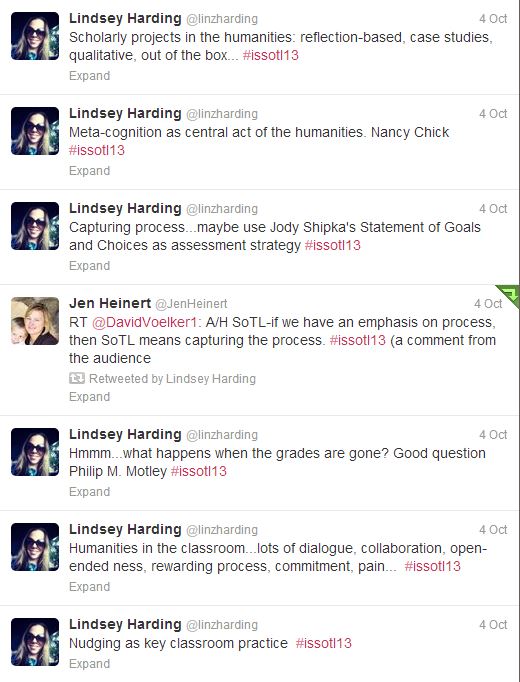 I want to share a panel conversation I listened to and tweeted about from this year’s International Society for the Scholarship of Teaching and Learning (ISSoTL) Conference, held in Raleigh, North Carolina, October 2-5. The panel was called SoTL in the Humanities and the Arts: Common Ground and Relevant Differences. Nancy Chick (Vanderbuilt University) served as the moderator, and Philip M. Motley (Elon University), Stephen Bloch-Shulman (Elon University), Deb Currier (Western Washington University), and Eduardo Gregori (University of Wisconsin – Marathon County) sat on the panel.
I want to share a panel conversation I listened to and tweeted about from this year’s International Society for the Scholarship of Teaching and Learning (ISSoTL) Conference, held in Raleigh, North Carolina, October 2-5. The panel was called SoTL in the Humanities and the Arts: Common Ground and Relevant Differences. Nancy Chick (Vanderbuilt University) served as the moderator, and Philip M. Motley (Elon University), Stephen Bloch-Shulman (Elon University), Deb Currier (Western Washington University), and Eduardo Gregori (University of Wisconsin – Marathon County) sat on the panel.
The questions the panel set out to discuss were big ones like these:
-
What does evidence of student learning look like in the fine arts, in English, in music, or in the foreign languages?
-
How do recent advancements in technology and computing affect the humanities, and are these changes consistent across the different disciplines?
And in the end, the panel hoped to accomplish the following: “to foster understanding, develop agreement, and build momentum in our common effort to mitigate perceived visibility issues related to the humanities disciplines in the scholarship of teaching and learning.” The discussion that took place on Friday, October 4th, successfully met these goals, although agreement often amounted to a recognition of complexity rather than a straightforward statement, and we didn’t quite get to a full discussion of how digital technology fits into the picture. Still, what we accomplished in that conference room was important, as we engaged in the process of reflecting on our core concerns and values in the arts and humanities to inspire a grounded yet innovative future for our scholarship and pedagogy.
The panel began the conversation with an attempt to define the fields. We understand the arts and humanities to be
- about what humans have created
- about creation and critique
- about communicating and exploring the human condition
- about finding voice and moving from internal to external
- about discovery and bringing the self to the world
Looking at these tasks, panel members and participants recognized the value of complexity and reflection. We resist simplification. We engage in metacognition as a central activity, affirms Chick.
Then we turned to look specifically at the classroom. There, we saw teachers and students as collaborators, actively engaged in the process of discovery. Teachers nudge students, and students, armed with their perceptions and worldviews, are encouraged through dialogue and open-ended conversations to discover their own interpretations. This process, we acknowledged, demands perseverance and pain. Yes, pain.
This discussion extended to the matter of grades. Motley asked, “I want to know what happens when grades are gone.” The panel discussed grading based on contracts and student reflections, instead of numbers and letters. Assessment rooted in students’ experience of the learning process enables assessment to participate in that process, not signal its end.
Discussion moved next to research methods and presentations, and how these should be approached and carried out in the humanities. Applying scientific study techniques to our work is not the best answer, the panel concluded. We’re not trained to do that work, and numbers can elide or gloss complexities. Yes, we need validity and standards, but we need to find a way to do that that corresponds with the skills, values, and concerns of our fields. In other words, how do we gather, analyze, and share data that captures process? The panel suggested annotated think-alouds as a research method followed by reflective presentations based on process.
Toward the end of the session, Chick steered the conversation back to questions, and we considered the future of the scholarship of teaching and learning in the arts and humanities: Together, we wondered,
How do we capture student learning?
What is our data?
How do we make learning visible?
How do we negotiate the tension between professionalization in the humanities and best practices for teaching and learning?
To answer these questions, to keep moving forward, I believe we need to keep in mind the choruses echoed throughout this panel discussion: honor complexity, engage in conversation, reflect on process.
